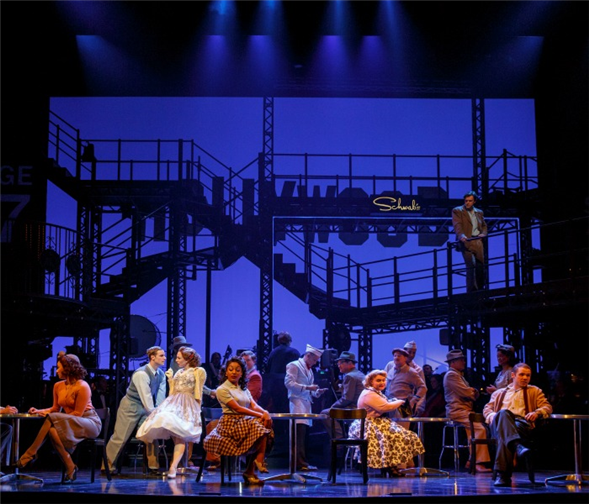Translate Page

Musical director Kristen Blodgette on her big role in Sunset Boulevard
---
There's been a great deal of fanfare surrounding Glenn Close's return to her Tony-winning role of Norma Desmond in the current revival of Sunset Boulevard. But she's not the only artist who worked on the original Broadway production who's come back. During the '90s run of Sunset, Kristen Blodgette served as associate musical supervisor. This time around her part has gotten bigger: She's the show's musical director, musical supervisor, and conductor of its 40-piece orchestra -- reportedly the largest on Broadway since 1935's Porgy and Bess.
Though Close is the star, the orchestra is also enjoying a bit of the spotlight. Instead of being relegated to the pit, all of the musicians are in view on stage throughout, just behind the actors. Their large ranks lend Andrew Lloyd Webber's classical-infused melodies a sweeping resonance, as if hearing a philharmonic play a symphonic film score. (Appropriate, considering Sunset Boulevard is based on Billy Wilder's 1950 cinematic classic about a faded, fractured, and manipulative silent film star desperate to make a Hollywood comeback.) Blodgette even gets a center-stage bow at the end, a first for the veteran music maven who began her Broadway career back in the '80s on another Lloyd Webber show: Cats.
"When they first told me about the Sunset curtain call, I told my husband, 'Oh my god, I have to walk too?" she says laughing. "I was thrilled with it but I thought, yikes, that's new one."
While it's fitting Blodgette and her orchestra are getting so much attention, she admits that, even after three-plus decades in the business and 13 Main Stem productions to her credit, she's not accustomed to it. "I'm used to staying under the radar, which is a role I'm comfortable with," she says. "But this has been an unbelievable opportunity. I told the orchestra on opening night, I don't know if I've experienced anything in my career that's as exciting as this."
Not that it's been a cakewalk. Director Lonny Price, set designer James Noone, musical coordinator David Lai, and Blodgette had many meetings trying to figure out just where they were going to put all those people. "It's really challenging to fit 40 musicians on stage -- more difficult than I can even express," Blodgette says. "David had me on Skype and mapped it out with the designer and then we got everyone there and we didn't fit! There was only so much space we could have before we were occupying the entire playing area of the company. There was talk of remoting a player or a section, but we didn't want to do that because part of the lushness was being able to see and feel the orchestra. We have lots of levels and people in corners. A lot of them are crunched, but they're all very happy to be playing this material. And then to be featured in this way, they were probably more willing to compromise as far as they could with space."
{Image1}
Another significant difficulty: Due to the placement of the orchestra, Blodgette can't see the performers. "It's scary -- scary and wonderful," she says. "It's like walking a high wire: I love the challenge of it. Every night with [Close's big second-act solo] 'As If We Never Said Goodbye,' I'm trying to read Glenn with my back to her, to know what she's feeling, where she's going, how she's moving musically, dramatically, her intentions. How do we start it out of thin air? Do I wait? Do I go? Almost every single moment of the show is underscored. You should never feel like, it's song time now! The actors are watching me on monitors but I'm not able to see them. That adds another dimension to it. But I wouldn't trade it for anything. I love having the orchestra on stage."
Blodgette has known what she wanted to do since age 10 when she wrote, 'I want to be a Broadway conductor' in her journal. She first fell in love with musical theatre in her native Ohio, seeing offerings at Cleveland's Hanna Theatre with her parents. On a school trip to New York, she saw her first Broadway shows on the same day: the original productions of Pacific Overtures and Shenandoah. And while her taste has remained just as eclectic, Blodgette admits her talents are most suited to traditional musicals, which explains her long and rich association with Lloyd Webber, including stints on The Phantom of the Opera, The Woman in White, revivals of Evita and Jesus Christ Superstar, and both Broadway productions of Cats and Sunset Boulevard.
"I was so fortunate to start on Andrew's shows," she says. "They all require really strong singing and I love doing vocal work. His shows seem to make use of the things which I do the best. There is something about his music that I feel I understand. If somebody asked me to do a rock show I would take myself out of the running. It wouldn't be my strength. As I watch the changes in musical theatre and the new composers, I'm totally interested in it and yet I am careful with what I do. One has to be I think. I'm not going to be good at Rock of Ages or American Idiot. I saw them and thought they were fantastic, but I wouldn't have done a great job on those shows."
---
Follow Raven Snook at @RavenSnook. Follow TDF at @TDFNYC.
Top image: The cast (and behind them, the orchestra) of Sunset Boulevard. Photo by Joan Marcus
TDF MEMBERS: Browse our discounted tickets to theatre, dance, and concerts.